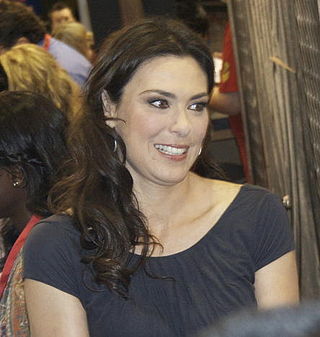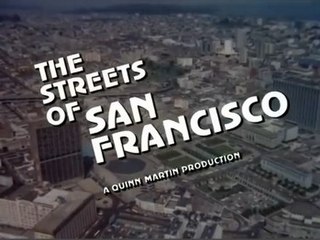Matlock is an American mystery legal drama television series created by Dean Hargrove and starring Andy Griffith in the title role of criminal defense attorney Ben Matlock. The show, produced by Intermedia Entertainment Company, The Fred Silverman Company, Dean Hargrove Productions and Viacom Productions, originally aired from March 3, 1986, to May 8, 1992, on NBC, then on ABC from November 5, 1992, to May 7, 1995.

Dragnet is an American media franchise created by actor and producer Jack Webb, following Los Angeles Police Department (LAPD) Detective Joe Friday and his partners as they conduct by-the-book police work and solve crimes in Los Angeles. Originating as a radio drama on NBC in 1949, Dragnet has been adapted into several successful television shows and films, though the franchise's popularity has reduced since Webb's death in 1982. Its name is derived from the police term "dragnet", a system of coordinated measures for apprehending criminals or suspects.

Michelle Renee Forbes Guajardo is an American actress who has appeared on television and in independent films. She is a Saturn Award winner with three nominations.

Columbo is an American crime drama television series starring Peter Falk as Lieutenant Columbo, a homicide detective with the Los Angeles Police Department. After two pilot episodes in 1968 and 1971, the show originally aired on NBC from 1971 to 1978 as one of the rotating programs of The NBC Mystery Movie. Columbo then aired less frequently on ABC from 1989 to 2003.

The Streets of San Francisco is an American television crime drama filmed on location in San Francisco and produced by Quinn Martin Productions, with the first season produced in association with Warner Bros. Television.
A television pilot in United Kingdom and United States television, is a standalone episode of a television series that is used to sell a show to a television network or other distributor. A pilot is created to be a testing ground to gauge whether a series will be successful. It is, therefore, a test episode for the intended television series, an early step in the series development, much like pilot studies serve as precursors to the start of larger activity.
Homicide: Life on the Street is an American police drama television series chronicling the work of a fictional version of the Baltimore Police Department's Homicide Unit. Created by Paul Attanasio, it ran for seven seasons and 122 episodes on NBC from January 31, 1993, to May 21, 1999, and was succeeded by Homicide: The Movie (2000), which served as the series finale. The series was created by Paul Attanasio and based on David Simon's book Homicide: A Year on the Killing Streets (1991). Many of the characters and stories used throughout the show were based on events depicted in the book.
Monk is an American comedy-drama detective television series that originally ran on the USA Network from July 12, 2002, to December 4, 2009, with 125 episodes broadcast over eight seasons. The series follows Adrian Monk, a private detective with obsessive–compulsive disorder and multiple phobias, and his assistants Sharona Fleming and Natalie Teeger. Monk works with the San Francisco Police Department in solving unconventional cases while investigating his wife's unsolved murder. The show also explores the personal lives and struggles of the main characters.
The NBC Mystery Movie is an American television anthology series produced by Universal Pictures, that NBC broadcast from 1971 to 1977. Devoted to a rotating series of mystery episodes, it was sometimes split into two subsets broadcast on different nights of the week: The NBC Sunday Mystery Movie and The NBC Wednesday Mystery Movie.

Barney Miller is an American sitcom television series set in a New York City Police Department police station on East 6th St in Greenwich Village. The series was broadcast on ABC Network from January 23, 1975, to May 20, 1982. It was created by Danny Arnold and Theodore J. Flicker. Noam Pitlik directed the majority of the episodes. It spawned a spin-off series, Fish, that ran from February 5, 1977, to May 18, 1978, focusing on the character Philip K. Fish.

Hunter is an American crime drama television series created by Frank Lupo, which ran on NBC from September 18, 1984, to April 26, 1991. It stars Fred Dryer as Sgt. Rick Hunter and Stepfanie Kramer as Sgt. Dee Dee McCall. The title character Sgt. Rick Hunter is a wily, physically imposing, often rule-breaking homicide detective with the Los Angeles Police Department.
Law & Order is a media franchise composed of a number of related American television series created by Dick Wolf and produced by Wolf Entertainment. They were originally broadcast on NBC, and all of them deal with some aspect of the criminal justice system. Together, the original series, its various spin-offs, the TV film, and crossover episodes from other shows constitute over 1,000 hours of programming.

Harry O, sometimes spelled Harry-O, is an American private detective series that aired for two seasons on ABC from 1974 to 1976. The series starred David Janssen, and Jerry Thorpe was executive producer. Harry O followed the broadcast of two pilot films: firstly Such Dust as Dreams Are Made On and secondly Smile Jenny, You're Dead, both starring Janssen.

Police Woman is an American police procedural television series created by Robert L. Collins starring Angie Dickinson that ran on NBC for four seasons, from September 13, 1974, to March 29, 1978.

The first season of Homicide: Life on the Street, an American police procedural drama television series, originally aired in the United States on NBC between January 31 and March 31, 1993. The show was created by Paul Attanasio, with film director Barry Levinson and television writer and producer Tom Fontana serving as executive producers. Adapted from David Simon's 1991 non-fiction book Homicide: A Year on the Killing Streets, the season followed the fictional detectives of Baltimore Police Department homicide unit and the murder cases they investigate. The show was broadcast on Wednesdays at 9 p.m. EST, with the exception of the series premiere, which aired immediately after Super Bowl XXVII.

The second season of Homicide: Life on the Street, an American police procedural drama television series, originally aired in the United States between January 6 and January 27, 1994. Due to low Nielsen ratings during the first season, NBC executives decided to order only a four-episode season, after which they would evaluate the ratings and decide whether to renew the show. Homicide was moved to a new timeslot of Thursdays at 10 p.m. EST, temporarily replacing the legal drama L.A. Law. NBC requested several changes from the series, including fewer episode subplots and less camera movements and jump cuts.

"Three Men and Adena" is the fifth episode of the first season of the American police drama television series Homicide: Life on the Street. It originally aired on NBC in the United States on March 3, 1993. The episode was written by executive producer Tom Fontana and directed by Martin Campbell. In the episode, Pembleton and Bayliss have a 12-hour limit to elicit a confession from Risley Tucker for the murder of 11-year-old Adena Watson. The episode takes place almost entirely within the confines of the police interrogation room with the three actors.

"Son of a Gun" is the third episode of the first season of the American police drama television series Homicide: Life on the Street. It originally aired on NBC in the United States on February 10, 1993. The teleplay was written by James Yoshimura based on a story by executive producer Tom Fontana, and the episode was directed by Nick Gomez. In the episode, recurring character Officer Thormann is shot while on duty, and his close friend Crosetti takes the investigation personally.

"A Dog and Pony Show" is the sixth episode of the first season of the American police drama television series Homicide: Life on the Street. It originally aired on NBC in the United States on March 10, 1993. In the episode, Pembleton and Bayliss investigate the murder of a police dog, Crosetti helps his friend adjust after a serious injury, and Felton and Howard suspect a drug dealer for a brutal murder.
"Nearer My God to Thee" is the third season premiere of the American police drama television series Homicide: Life on the Street, and the fourteenth overall episode of the series. It originally aired on NBC in the United States on October 14, 1994. In the episode, the homicide department is assigned to the politically volatile murder of a beloved social worker, whose body is found wearing nothing but a pair of white gloves. Meanwhile, Felton struggles with marital problems, while Lewis and Munch try to find a business partner with whom to open a bar.













